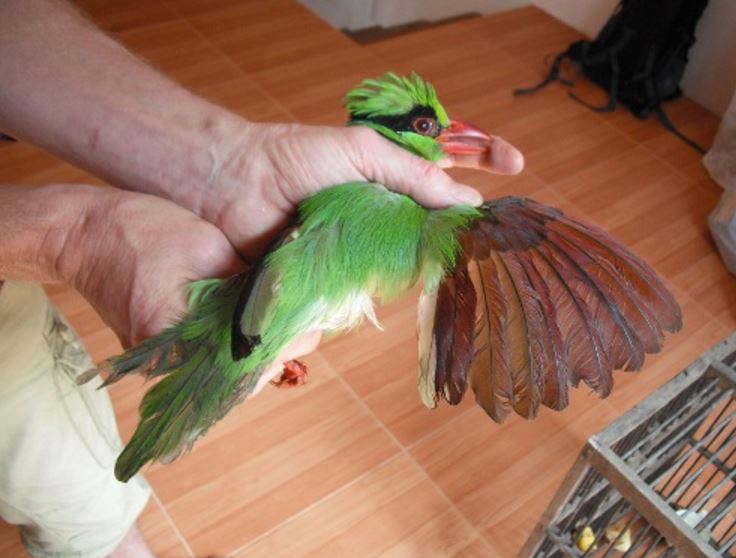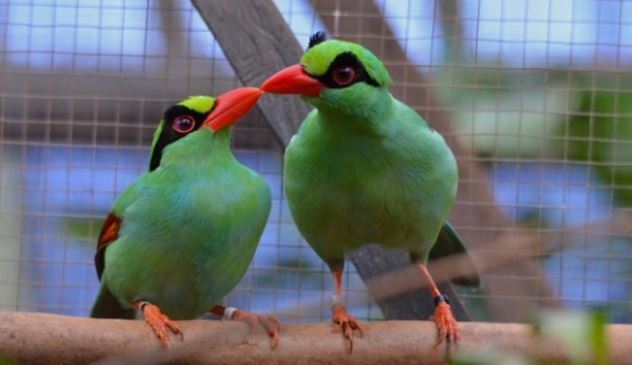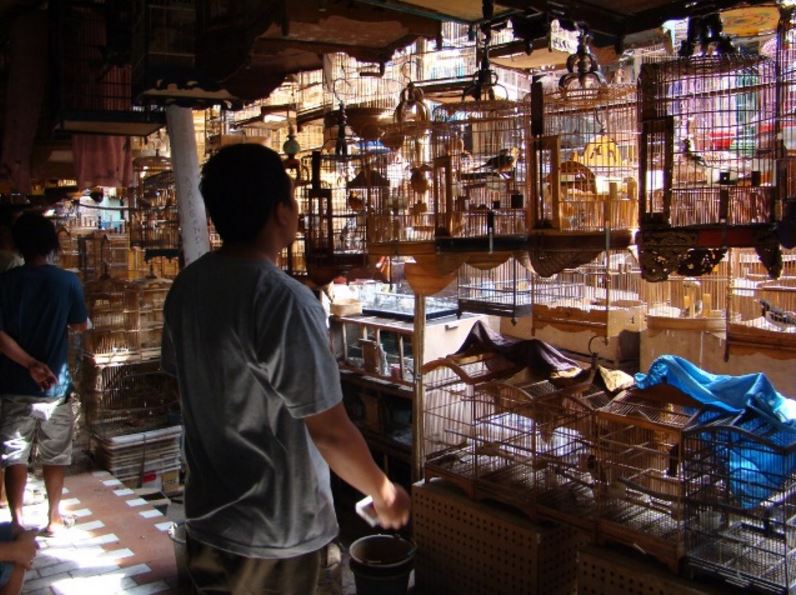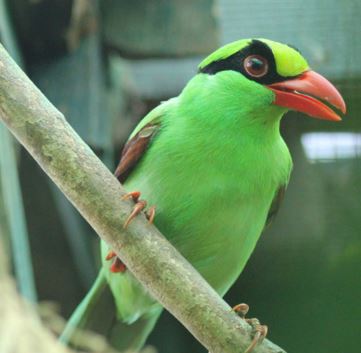The world’s rarest magpie, the Javan Green Magpie (Cissa thalassina), has been brought to Chester Zoo, as conservationists embark on a breeding programme in Europe aimed at saving one of the most endangered birds on the globe.
According to Bird Life International, this recently-split species, which is now Critically Endangered – i.e. it has been categorized by the International Union for Conservation of Nature (IUCN) as facing a very high risk of extinction in the wild – has a tiny and fragmented population.
On-going trapping (poaching) and continued loss and degradation of suitable habitat has pushed this beautiful bird to the edge of extinction.
 A Javan Green Magpie being examined by Andrew Owen, who works at Chester Zoo. He will provide expertise for the project with advice and support and one day hopes to see a viable safety net population, which in turn can support conservation efforts to save this beautiful bird in the wild. (Image: Chester Zoo)
A Javan Green Magpie being examined by Andrew Owen, who works at Chester Zoo. He will provide expertise for the project with advice and support and one day hopes to see a viable safety net population, which in turn can support conservation efforts to save this beautiful bird in the wild. (Image: Chester Zoo)
Chester Zoo’s Javan Green Magpie population
The bird, a native of Indonesian forests, joins three pairs of birds at Chester Zoo that have been released into their outdoor aviaries for the first time.
The programme aims to significantly increase the captive population of Javan Green Magpies, and then gradually introduce them back to the wild. All the birds had been brought in from abroad six weeks ago, and have spent that time in quarantine.
Conservationists said it was a great relief to get the birds out after their quarantine period. They believe there are fewer than 100 of these birds in the wild globally.
The first things the birds did when they were let out into the large aviary was to chirp at each other and gobble up the live locusts that had been placed on several branches for them.
Bird Life International says there are probably fewer than 250 mature Javan Green Magpies in the wild, with each sub-population containing no more than 50 mature individuals. Some studies have estimated its total wild population to be below 100 mature individuals.
On the Indonesian island of Java, where the Javan Green Magpie used to thrive, most forests below 1,000 metres (altitude) and in some areas up to 1,500 metres – the bird’s principal habitat – have been cleared, mainly because of logging, agricultural expansion and mining.
 For the Javan Green Magpie to exist in the wild, it just needs two things from us: 1. To respect its natural habitat. 2. To stop catching it and selling it to the bird cage market. (Image: actforwildlife.org.uk)
For the Javan Green Magpie to exist in the wild, it just needs two things from us: 1. To respect its natural habitat. 2. To stop catching it and selling it to the bird cage market. (Image: actforwildlife.org.uk)
Commonly trapped and sold to bird cage market
The bird is commonly trapped and sold to the cage-bird trade, another factor that has threatened its population, apart from habitat loss. However, there are now fewer records of this bird being sold in markets.
In Indonesia, people have always kept birds in cages – it is a custom that has been continuing for hundreds of years. However, recently, this has exploded, and there are literally tens of millions of birds in tiny cages across the country.
 An Indonesian bird market. Sadly, the birds suffer a lot in them and do not live very long. (Image: actforwildlife.org.uk)
An Indonesian bird market. Sadly, the birds suffer a lot in them and do not live very long. (Image: actforwildlife.org.uk)
Sadly, most of them do not live very long. Chester conservationists say they suffer very badly during their short lives in cages.
The European programme has set up an ‘insurance population’ which won’t be affected by poachers and people’s obsession with keeping them in tiny cages.
Andrew Owen, Chester Zoo’s Curator of Birds, said it is going to take a while to build up the population and then find a safe wild environment they could be released to.
Mr. Owen said:
“It’s a long-term project, it’s going to take many years. We’re in it for the long haul. We’re going to do everything to stop these birds becoming extinct.”
Video – World’s rarest magpie at Chester Zoo
In this BBC video, three pairs of Javan Green Magpies are released into an outdoor aviary after spending six weeks in quarantine. Andrew Owen talks to us about them.


Comments are closed.